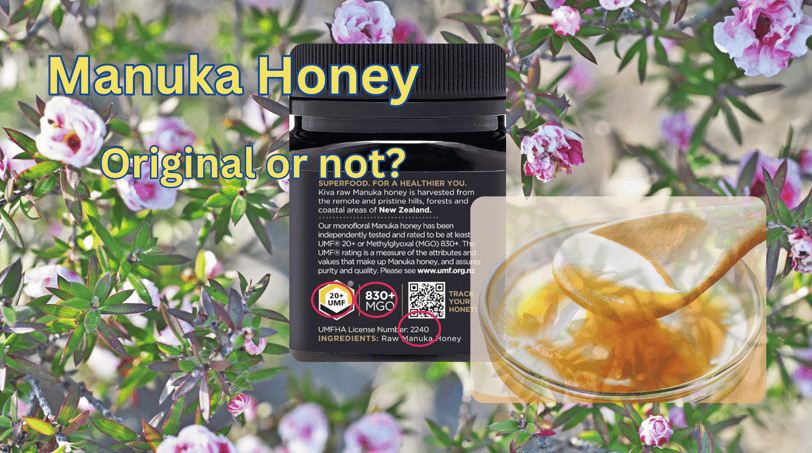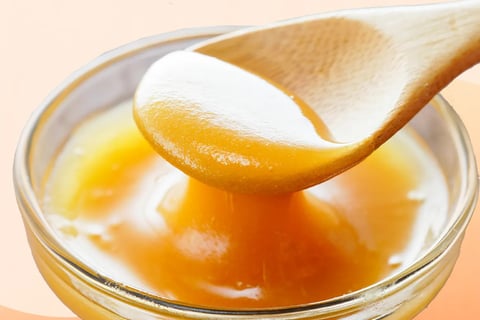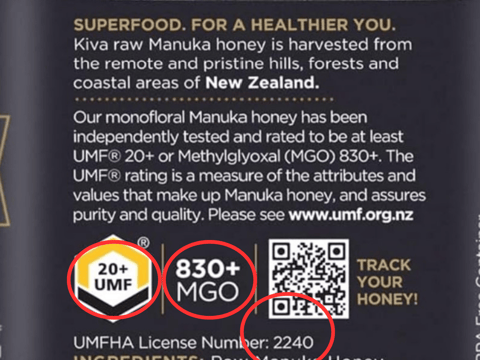How to Know That Manuka Honey is Original and Certified: Your Complete Guide to Authentic Manuka Honey
"Learn how to identify authentic Manuka honey with our complete guide. Discover certification marks, UMF ratings, MGO levels, and key indicators to ensure you're buying genuine, high-quality Manuka honey from New Zealand."
NATURAL TREATMENTS
Dr.Asem
6/19/20255 min read


Manuka honey has gained worldwide recognition as a premium superfood with exceptional health benefits. However, with its growing popularity comes an increase in counterfeit products flooding the market. Learning how to identify genuine, certified Manuka honey is crucial for consumers who want to experience its true therapeutic benefits while avoiding inferior imitations.
What is Manuka Honey?
Manuka honey is a unique type of honey produced by bees that pollinate the Manuka bush (Leptospermum scoparium), which grows exclusively in New Zealand and southeastern Australia. Unlike regular honey, Manuka honey contains methylglyoxal (MGO), a compound responsible for its distinctive antibacterial properties and therapeutic benefits.
The Manuka bush blooms for only 2-6 weeks per year, making genuine Manuka honey a rare and valuable commodity. This limited harvesting window, combined with the specific geographical requirements, contributes to its premium price and makes it a target for fraudulent products.
Health Benefits of Authentic Manuka Honey
Genuine Manuka honey offers numerous scientifically-backed health benefits that set it apart from regular honey:
Antibacterial and Antimicrobial Properties: The high concentration of MGO provides powerful antibacterial effects, making it effective against various harmful bacteria, including antibiotic-resistant strains.
Wound Healing Support: Medical-grade Manuka honey has been shown to accelerate wound healing, reduce inflammation, and prevent infection when applied topically.
Digestive Health Enhancement: Regular consumption may help soothe digestive issues, reduce acid reflux symptoms, and support overall gut health by promoting beneficial bacteria growth. Also, many studies show that it is effective against H pylori which is responsible for peptic ulcer.
Immune System Boost: The antioxidants and antimicrobial compounds in Manuka honey can help strengthen your immune system and fight off infections.
Skin Health Benefits: When used in skincare routines, Manuka honey can help treat acne, eczema, and other skin conditions while providing moisturizing and anti-aging effects.
Oral Health Support: Studies suggest that Manuka honey may help reduce dental plaque, gingivitis, and bad breath when used as part of oral care routines.
Important Precautions and Considerations
While Manuka honey is generally safe for most people, certain precautions should be observed:
Infants Under 12 Months: Never give honey, including Manuka honey, to babies under one year old due to the risk of infant botulism.
Diabetes Management: People with diabetes should consume Manuka honey in moderation and monitor blood sugar levels, as it can affect glucose levels like other sweeteners.
Allergic Reactions: Those with bee or pollen allergies should consult healthcare providers before using Manuka honey and start with small amounts to test for reactions.
Medication Interactions: If you're taking medications, especially blood thinners or diabetes medications, consult your doctor before regular Manuka honey consumption.
Quality Matters: Only authentic, certified Manuka honey provides the advertised health benefits, making proper identification essential.
How to Identify Original and Certified Manuka Honey?
Distinguishing authentic Manuka honey from imitations requires attention to specific certification markers and quality indicators:
Official Certification Systems
UMF (Unique Manuka Factor) Rating: Look for the official UMF trademark on the label. Genuine UMF-certified honey displays ratings from UMF 5+ to UMF 20+, with higher numbers indicating stronger antibacterial activity. The UMF rating system is managed by the UMF Honey Association and ensures authenticity.
MGO Rating: Methylglyoxal content is measured in milligrams per kilogram (mg/kg). Authentic Manuka honey will clearly display MGO ratings, typically ranging from MGO 30+ to MGO 550+. Higher MGO numbers indicate stronger therapeutic properties.
Molan Gold Standard (MGS): Some producers use the MGS rating system, which measures the same antibacterial activity as UMF but uses a different scale.
Label Verification Checklist
Country of Origin: Authentic Manuka honey must be labeled as "Product of New Zealand" or "Product of Australia." Be wary of products claiming to be from other countries.
Producer Information: Legitimate producers will clearly display their company name, address, and contact information on the packaging.
Batch Numbers and Traceability: Genuine Manuka honey includes batch numbers that allow tracing back to the specific harvest and location.
Certification Logos: Look for official certification logos from recognized bodies like the UMF Honey Association or MGO certification marks.
Physical Characteristics
Texture and Consistency: Real Manuka honey typically has a thick, creamy texture and may crystallize over time, which is a natural process indicating authenticity.
Color: Authentic Manuka honey ranges from light amber to dark brown, depending on the MGO content and harvest conditions.
Taste Profile: Genuine Manuka honey has a distinctive, slightly medicinal taste with earthy undertones, unlike the overly sweet taste of regular honey.
Packaging Quality: Authentic products typically come in high-quality glass jars with professional labeling and tamper-evident seals.
Price Considerations
Realistic Pricing: Genuine Manuka honey is expensive due to its rarity and production costs. Be suspicious of products priced significantly below market rates, as they're likely counterfeit.
Value Correlation: Higher UMF or MGO ratings command premium prices. Extremely low prices for high-rated Manuka honey are red flags for fake products.
Retailer Verification
Authorized Retailers: Purchase from reputable health food stores, pharmacies, or authorized online retailers with good customer reviews and return policies.
Documentation: Legitimate sellers can provide certificates of authenticity and lab test results upon request.
Red Flags to Avoid
Several warning signs indicate potentially fake Manuka honey:
Labels claiming impossibly high UMF or MGO ratings (above UMF 20+ or MGO 550+)
Products lacking proper certification markings or displaying fake certification logos
Honey claiming to be "Manuka blend" or "Manuka style" rather than pure Manuka honey
Packaging with spelling errors, poor print quality, or missing mandatory information
Prices that seem too good to be true for the claimed quality level
Products from unauthorized regions or questionable online marketplaces
Conclusion
Identifying authentic, certified Manuka honey requires careful attention to certification systems, labeling details, and physical characteristics. By understanding the UMF and MGO rating systems, verifying country of origin, checking for proper certification logos, and purchasing from reputable retailers, consumers can confidently invest in genuine Manuka honey that delivers the promised health benefits.
Remember that authentic Manuka honey is a premium product with a corresponding price point. While the initial investment may be higher than regular honey, the unique therapeutic properties and health benefits of genuine Manuka honey make it a worthwhile addition to your wellness routine. Always prioritize quality over price when selecting Manuka honey, and don't hesitate to ask retailers for certificates of authenticity to ensure you're getting the real deal.
By following these guidelines and staying informed about the latest certification standards, you can enjoy the full benefits of this remarkable natural product while avoiding the disappointment and potential health risks associated with counterfeit alternatives.




Medical Disclaimer: The content on DR.ASEM MD is provided for educational and informational purposes only and is not intended as medical advice, diagnosis, or treatment. The information regarding health, fitness, natural treatments, health tools, health products, medicine, surgery, and obesity management should not replace professional medical consultation. Any changes to your treatment plans or health decisions must be made in consultation with your healthcare provider or by consulting Dr. Asem, who is responsible for this website. Always seek the advice of qualified healthcare professionals before starting any new treatment or making changes to existing medical care. DR.ASEM MD disclaims any liability for actions taken based on the information provided on this website.
Connect
Join our community for health and wellness.
Support
Email: info@drasemmd.com
© 2025. All rights reserved.


